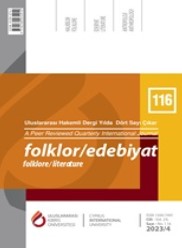The Parody of Myth/Metaphysics and Estrangement Effect in Efrâsiyâb’ın Hikâyeleri (Efrasiyab’s Tales) by İhsan Oktay Anar
The Parody of Myth/Metaphysics and Estrangement Effect in Efrâsiyâb’ın Hikâyeleri (Efrasiyab’s Tales) by İhsan Oktay Anar
Author(s): Vedi Aşkaroğlu, Dinara Ashimova, Nurzat DyussenovSubject(s): Metaphysics, Comparative Studies of Religion, Turkish Literature, Theory of Literature
Published by: Uluslararası Kıbrıs Üniversitesi
Keywords: Efrâsiyâb’ın Hikâyeleri; postmodernism; parody; estrangement; myth; metaphysics;
Summary/Abstract: Every age has its own dynamics as regards politics, social life, culture, power relations, and perception of art. Accordingly, the twenty-first century is a period when postmodern view of the world forms the central, dominant approach in literature. The novel is no longer “created” but “produced” through such new concepts as parody, pastiche, collage, intertextuality, and metafiction with a desire to incorporate a polyphonic worldview, create the effect of alienation, and show the relative nature of what has been called “real(ity)”. In this article, first a brief theoretical discussion of the postmodern parody, which is achieved through the use of intertextuality and irony, is presented. The theoretical basis of such narrative techniques are constructed, pertaining to how they can be handled, evaluated, used in literary analysis through the formation, and the maintenance of new discourses might be clearly understood. Then, the use of “parody” and “irony” in “Efrasiyab’s Tales” is analyzed and how the mythical, metaphysical beliefs, ideas, and values are parodied in the newly created context is reflected. Through the analysis, it is indicated that postmodern texts, as exemplified in “Efrasiyab’s Tales”, present various appearances of what is accepted as real(ity) and lead the reader into questioning and (re-)evaluating it from different perspectives. In the article, how the author uses and parodies so many mythological stories, names, scripts from the holy books of Judaism, Christianity, İslam and even Buddhism is discussed in relation to the main texts. Some ideas, beliefs, rituals and practices are handled in an ironic way and parodied so that the reader is forced to re-evaluate all s/he has as ideology, belief, religion, culture (or anything belonging to culture and civilization) in the modern world.
Journal: Folklor/Edebiyat
- Issue Year: 29/2023
- Issue No: 116
- Page Range: 1197-1212
- Page Count: 16
- Language: English

